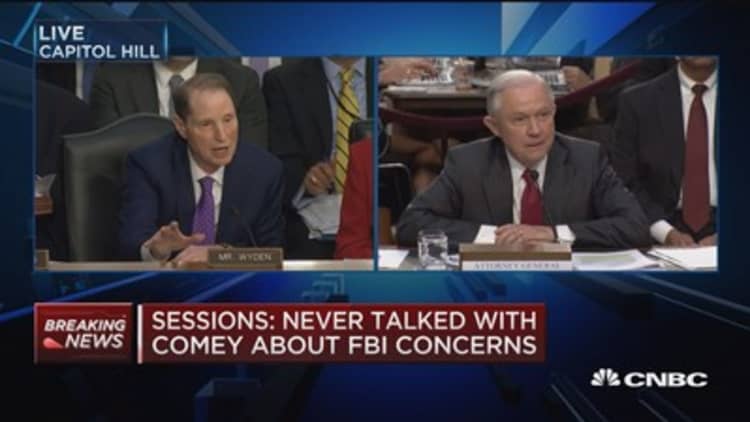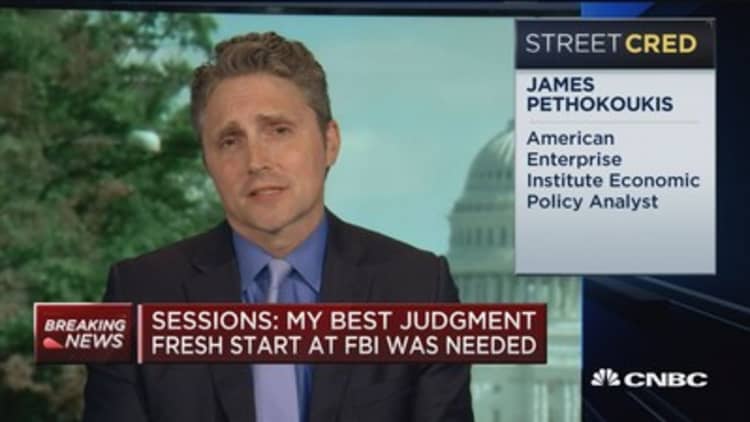
Attorney General Jeff Sessions on Tuesday forcefully denied collusion with Russian officials ahead of the 2016 election and contended that he has maintained a safe distance from the probe into Moscow's interference.
In a closely-watched hearing that lasted more than two and a half hours, Sessions sidestepped repeated questions about his private talks with President Donald Trump, without offering a clear explanation about why he could not answer. The attorney general called any accusation of him colluding with Russia an "appalling and detestable lie" and was, at times, combative in his exchanges with senators.
"Let me state this clearly: I have never met with or had any conversations with any Russians or any foreign officials concerning any type of interference with any campaign or election," Sessions told the Senate Intelligence Committee. "Further, I have no knowledge of any such conversations by anyone connected to the Trump campaign."
Sessions' testimony comes at a tumultuous time for Trump, who faces accusations that he tried to influence the investigation into his campaign's ties to the Kremlin. Trump's abrupt ouster of Comey last month set into motion a sequence of events including the appointment of a special counsel, former FBI Director Robert Mueller, to oversee the probe.
In March, Sessions recused himself from that investigation following revelations that he was not forthcoming during his confirmation hearing about those two meetings with the Russian ambassador to the U.S.
The attorney general also said he did not remember a "third meeting" or conversation with Russian officials last year — beyond the two that he has acknowledged as part of his role as a then-senator. However, Sessions — a top Trump campaign advisor — did not rule out that a conversation could have happened.
Former FBI Director James Comey told senators in a closed session Thursday about a "possible third interaction" between Sessions and "Russian officials" last year, according to NBC News.
Comey raised more questions last week when he said the FBI was "aware of facts" about Sessions' ability to be involved in the investigation that he could not say in an open hearing. He cited this as a reason why he did not tell Sessions about a Trump statement he deemed a request to "drop" an investigation into former national security advisor Michael Flynn.
Sessions said he was not "briefed on any investigative details" between getting sworn in on Feb. 9 and recusing himself on March 2 and does not believe he was ever briefed on the Russian measures to influence the election.
Tempers flare
Sen. Ron Wyden, D-Ore., pressed Sessions about what Comey may have been talking about when he discussed the other reasons for his recusal.
"Why don't you tell me?" Sessions asked, raising his voice and his eyebrows. "There are none. There are none, Senator Wyden. I can tell you that for absolute certainty."
Sessions insisted that he stepped back from the probe due only to a Justice Department regulation that employees "should not participate in investigations of a campaign if they have served as a campaign advisor."

The attorney general repeatedly said he could not talk about whether he had private conversations with Trump concerning Comey's firing or the Russia probe, even though he said Trump did not assert executive privilege. As Sen. Kamala Harris, D-Calif., repeatedly pressed Sessions about his legal justification for withholding those answers, they talked over one another until Harris' colleagues interrupted.
Sessions said he had "confidence" in Mueller, amid reports that Trump may push for his removal next.
When Trump fired Comey, the White House said Trump did so "based on the clear recommendations of both Deputy Attorney General Rod Rosenstein" and Sessions. Critics have questioned why Sessions was involved in the decision, since he said he was distancing himself from the investigation.
He contended that writing a letter did not violate his earlier recusal. Sessions said it is not a "sound position" to say he could not carry out his duties related to the agencies he oversees because of one investigation.
Sessions said Tuesday that he and Rosenstein had a "clear view" that the FBI had "problems" and needed a fresh start. They were asked their opinions and felt comfortable putting them into writing, the attorney general said.
Confirms part of Comey testimony
Trump almost immediately contradicted the White House last month when he said he would have fired Comey "regardless" of the Justice Department recommendation.
Asked by Sen. Dianne Feinstein, D-Calif., if he agreed with Trump's assessment, Sessions said he would let Trump speak for himself.

Sen. Jack Reed, D-R.I., later pressed Sessions about whether he felt misled by Trump when the president said publicly that he thought about the "Russia thing" when he fired Comey. Sessions did not comment on that or a question about whether he had any "inkling" about the Russia probe being a possible motive.
Sessions also confirmed parts of the testimony Comey made last week. He said Comey did come to him a day after a February conversation with Trump and asked about preventing any more one-on-one conversations with Trump.
However, he said he told Comey to seek out the appropriate channels to talk about his concerns with the president. Comey said Sessions did not reply after he made the statement.
Sessions said he "did respond" to Comey but "perhaps not to everything he asked."


